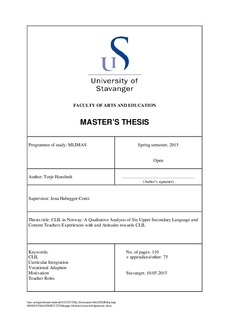| dc.contributor.author | Hunsbedt, Torje Eidhammer | |
| dc.date.accessioned | 2015-07-07T09:23:14Z | |
| dc.date.available | 2015-07-07T09:23:14Z | |
| dc.date.issued | 2015-05-13 | |
| dc.identifier.uri | http://hdl.handle.net/11250/286649 | |
| dc.description | Master's thesis in Literacy studies | nb_NO |
| dc.description.abstract | The present thesis is an investigative study of six Norwegian upper secondary teachers’ experiences with and attitudes towards CLIL – Content and Language Integrated Learning – and similar approaches that seek to integrate the teaching of contents and the teaching of language. It also provides a thorough review of vocationally adapting general subjects (in this case English) in vocational schools. The study focuses on and questions the role of the teacher in CLIL, and ultimately poses the question whether extended use of CLIL in Norwegian schooling can be viewed as likely to occur successfully as it is expected, as well as exploring which of these curricular integrated modalities are generally aimed for, given the inherently varying contents of the non-language disciplines.
The present study provides an outline of some features of the CLIL-approach, the Norwegian schooling system and the parts of the English Subject Curriculum that exalt the instrumentality of the English language. The data for the analysis were obtained through qualitative in-depth interviews which were transcribed, analyzed and presented thematically, with ensuing discussions.
The main finding is that vocational adaption of English is the most systemic and widespread integrated approach in the Norwegian context. Moreover, the integration with language is often paired with vocational and practical subjects, which in turn provides perceived benefits for many students, but also great challenges for teachers, in terms of self-training and in terms of increased cooperation. In study preparatory contexts, language and content integration was found to be conducted as practical project work or as partial bilingual courses. In both cases, the role of language was reduced to merely an instrumental one. Teacher motivation and interest in teaching through the medium of English is crucial to success.
All the findings in this study only provide a tentative picture of the Norwegian situation. Yet, it poses relevant questions that might prove important if integrated approaches to learning are to gain a stronger curricular mandate in the future. | nb_NO |
| dc.language.iso | eng | nb_NO |
| dc.publisher | University of Stavanger, Norway | nb_NO |
| dc.relation.ispartofseries | Masteroppgave/UIS-HF-IKS/2015; | |
| dc.subject | literacy | nb_NO |
| dc.subject | lesevitenskap | nb_NO |
| dc.subject | CLIL | nb_NO |
| dc.subject | bilingval undervisning | nb_NO |
| dc.subject | bilingual teaching | nb_NO |
| dc.subject | teaching language | nb_NO |
| dc.subject | tospråklig undervisning | |
| dc.title | CLIL in Norway: A qualitative analysis of six upper secondary language and content teachers' experiences with and attitudes towards CLIL | nb_NO |
| dc.type | Master thesis | nb_NO |
| dc.subject.nsi | VDP::Humanities: 000::Literary disciplines: 040 | nb_NO |
